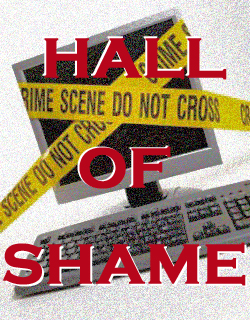The Techie Hall of Shame

 |
As always, there was a kicker: The 43-year-old Pittsburgh resident, Terry Childs, created an exclusive system password for himself. When the police demanded it, he gave them one that didn't work. When they threatened him with arrest, he still refused to divulge the correct password.
With this, Childs joins the IT Grind's newly-unveiled Techie Hall of Shame, joining the ranks of five others that share the dishonor of giving good IT pros a bad rap not only in the media, but with the FBI, which estimates that about 70 percent of all computer security breaches are perpetuated by internal hackers, a.k.a. "normal employees."
John Paul Oson Crime: Convicted last month of two charges of intentionally damaging computers in Southern California's Council of Community Health Clinic in December 2005, disabling the automatic backup process and deleting data and software from the company's servers.
The kicker: Authorities said he'd recently resigned after receiving a performance review "he perceived as negative"--as in, it sounds like the people who wrote it didn't think it was so bad.
Kenneth Kwak Crime: A former Department of Education network security specialist, Kwak was sentenced to five months in prison, a $40,000 fine and five months of home monitoring in March 2006 for putting spyware on his boss's computer.
The kicker: In his plea, Kwak said he'd used the spyware to read his boss's email and other inter-office communcations, not for profit, but to gossip with others in his office.
Yung-Hsun Lin Crime: The former systems administrator for Medco Health Solutions in Franklin Lakes, NJ planted a logic bomb in October 2003, which--had it not been discovered--could have wiped out such databases as the one that tracked patient-specific drug interaction conflicts.
The kicker: After his company was spun off from another in 2003, Lin was fearful that he'd be laid off. But even after he survived a round of layoffs, he kept the logic bomb in place, and even tinkered with it, setting it to go off on his birthday in 2004, knowing full well it could be easily traced back to him.
Roger Duronio Crime: The former UBS PaineWebber systems administrator in New Jersey was sentenced to eight-plus years in prison and to pay $3.1 million in fines for detonating a logic bomb that caused millions of dollars in damange to the brokerage's computer network in 2002 as some offices could not make trades for weeks.
The kicker: At his trial, witnesses testified that Duronio was angry because he didn't receive as large of an annual bonus as he'd expected. He'd quit a few weeks before his bomb went off.
Alan Giang Tran Crime: The former network administrator at the Airline Coach Service and Sky Limousine Company in California was arrested in February 2003 for hacking into his company's computer system and wiping out critical data shortly after his termination.
The kicker: While the damage wrought by Tran's meddling--thousands of dollars lost because drivers couldn't pick up passengers--was small by comparative accounts, the case details were like something out of the least suspenseful crime novel, ever: when the Feds searched his home, they found several computers with information regarding the company's computer systems in a file folder marked "retaliation."
Any other noteworthy "disgruntled IT pros" I should be adding to the list? Sadly, there are so many to choose from.